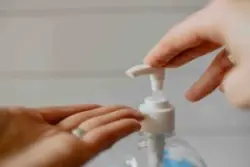
A 10-year-old boy was burned on his arms and legs after using a store-made sanitizer purchased at his local 7-Eleven. The owner of the store was charged with endangering the welfare of a child as well as deceptive business practices over the sale that caused the child injuries.
The Injury
Law enforcement discovered social media posting that published pictures of burns on the 10-year old’s arms and legs. The boy had a negative reaction to the sanitizer, which was made by the 7-Eleven and put on sale without a list of ingredients or a warning label. The boy told a local news reporter that he and his friends bought the sanitizer spray hoping it would protect them from contracting COVID-19. Within the first minutes after applying the sanitizer, he reported, he and his friends started feeling itchy. The child’s mother had to rush the boy to the emergency twice within a 36-hour period for nurses to try to relieve his pain. According to reports, three other children in addition to the 10-year-old boy had mild reactions to the store-made sanitizer, but did not need to visit the hospital for treatment.
Illegal Production and Sale
It is against the law to sell an unlabeled, untested, and unsafe product. Local authorities who investigated the injury do not believe that the 7-Eleven owner had malice or ill intent. In fact, authorities believe that the proprietor was trying to capitalize on the shortage of supply of sanitizer because of the pandemic. According to law enforcement, the business operator diluted foaming sanitizer with water and sold the bottles. Any remaining bottles of the store-made spray sanitizer and the ingredients used to make it were confiscated by police. While those affected turned in the bottles they had purchased, more than a dozen are still unaccounted for.
Damages Available
There are two general categories of damages, or monetary compensation, available to personal injury victims — compensatory and punitive. Compensatory damages are further divided into two types — economic and non-economic. Economic damages include money awarded to a plaintiff to cover financial harm including lost wages, medical expenses, property damage, and other quantitative losses. Non-economic damages, on the other hand, include harm that cannot be quantified, such as loss of enjoyment of life, loss of companionship, as well as pain and suffering. While compensatory damages are meant to make a personal injury victim whole, punitive damages are meant to punish a bad actor. Under Nevada law, NRS 42.005, a personal injury victim can be awarded punitive damages when the defendant’s behavior rises to malice, fraud, or oppression.
We Can Help
If you or a loved one has been hurt by a defective product in Nevada, contact the Las Vegas personal injury attorneys at H&P Law. We have helped thousands of injured victims fight for the monetary compensation they deserve. Do not try to navigate the legal system on your own. Contact us today for your initial case evaluation.




